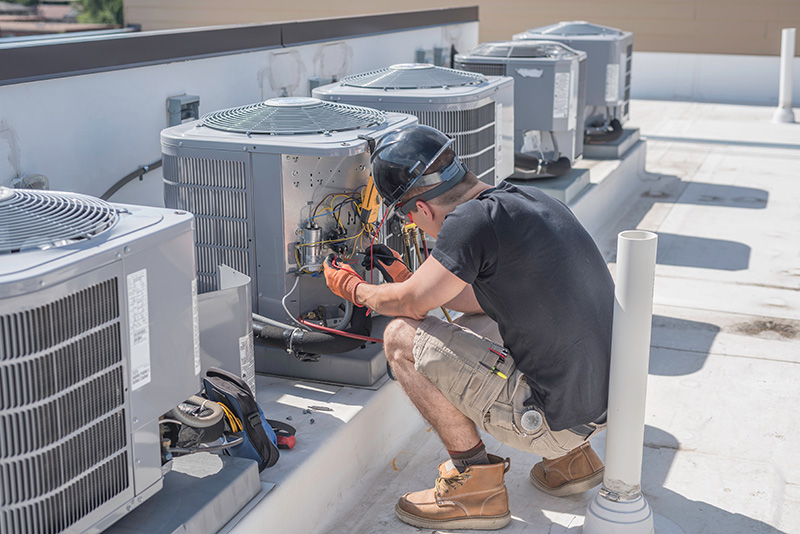How to Choose the Right Cooling And Heating System for Your Demands
Selecting the proper HVAC system is an essential decision that needs mindful consideration of different factors. The myriad of system types offered can complicate this procedure, leading one to wonder which course ultimately leads to optimal convenience and performance.
Assess Your Home Size
Analyzing your home size is an important initial step in picking the appropriate heating and cooling system. The size of your home straight affects the cooling and heating capacity required for efficient environment control. A heating and cooling system that is also tiny will certainly struggle to maintain comfortable temperatures, resulting in enhanced energy consumption and wear on the system. On the other hand, a large system can cause brief biking, insufficient moisture control, and ineffective procedure.
To precisely evaluate your home size, gauge the square footage of each area, thinking about aspects such as ceiling elevation and the design. Furthermore, think about the insulation high quality and the number of windows, as these aspects affect thermal performance. Houses with open flooring strategies may require various system setups compared to those with lots of split spaces.
Making Use Of the Handbook J load calculation approach can offer a more accurate estimate of your HVAC requires. This method make up different factors, consisting of regional climate, solar gain, and tenancy patterns. By very carefully assessing these facets, you can guarantee that your picked a/c system is appropriately sized, resulting in boosted comfort, power effectiveness, and long life of the devices.
Determine Your Spending Plan
Identifying your budget is a pivotal action in the heating and cooling system option process, as it establishes the parameters for your choices - DMAKS HVAC. A HVAC system is a significant financial investment, and understanding your monetary restrictions will assist limit choices that fit within your ways
Begin by assessing not just the first purchase cost yet also setup prices, which can vary dramatically depending on the complexity of the job. Consider ongoing costs such as upkeep, repairs, and power intake. A system may appear budget friendly initially but can result in higher expenses with time if it is less efficient.
It is recommended to assign a backup fund for unforeseen costs that might arise during setup or preliminary system modifications (DMAKS HVAC). Furthermore, check out funding choices or refunds that might be readily available, as these can reduce the worry of ahead of time prices
Eventually, having a clear budget enables you to involve with heating and cooling specialists better, guaranteeing you get customized guidance that aligns with your monetary objectives and home requirements. By being diligent regarding your spending plan, you can make enlightened choices that enhance convenience without jeopardizing economic stability.
Evaluate Power Efficiency
Energy performance plays an important function in the total efficiency and cost-effectiveness of your Heating and cooling system. Look for systems with a high Seasonal Energy Effectiveness Proportion (SEER) for cooling and a high Annual Gas Use Efficiency (AFUE) rating for heating.
Furthermore, think about the Energy Star qualification, which indicates that the system fulfills stringent efficiency guidelines set by the Environmental Security Company. Buying view website a Power Star-rated heating and cooling system can result in considerable cost savings gradually, especially in areas with extreme temperature fluctuations.
Another factor to evaluate is the system's size and ability. An extra-large or undersized unit can lead to inefficiency and raised power prices. DMAKS HVAC. Appropriate sizing, commonly figured out via a Hand-operated J tons computation, guarantees that the system operates at optimum effectiveness


Take Into Consideration Environment and Environment
When selecting a heating and cooling system, it is important to take into consideration the neighborhood environment and environmental conditions, as these elements considerably influence the system's performance and effectiveness. Different regions web link experience varying temperature extremes, humidity levels, and seasonal changes, all of which impact home heating and cooling down needs.

Furthermore, regional ecological elements, such as air top quality and potential allergens, need to inform your option. Equipments geared up with sophisticated filtering technologies can assist alleviate pollutants and offer cleaner air. Furthermore, take into consideration the energy sources offered in your location-- some HVAC systems are much more reliable when powered by gas or renewable energy sources.
Eventually, straightening your HVAC system choice with your neighborhood environment and environmental considerations a knockout post will result in improved convenience, boosted performance, and reduced energy expenses.
Explore System Types and Functions
As home owners look for to maximize convenience and performance, discovering the various sorts of a/c systems and their special attributes ends up being crucial. The primary types of heating and cooling systems include air conditioning, warmth pumps, ductless mini-split systems, and heating systems. Each system offers distinct advantages tailored to different needs and preferences.
Central air systems supply uniform cooling throughout a home, making them optimal for larger spaces. Heat pumps act as both home heating and cooling services, utilizing electricity to move warmth, which can lead to lower energy prices. Ductless mini-split systems are coming to be progressively popular as a result of their adaptability and simplicity of installation, permitting house owners to manage the temperature in specific spaces without comprehensive ductwork.

Conclusion
To conclude, picking the appropriate heating and cooling system requires cautious factor to consider of different variables, consisting of home dimension, budget restrictions, power performance, neighborhood environment, and readily available system kinds. A detailed analysis of these components makes certain optimum comfort and cost-effectiveness. By adhering to a structured approach, home owners can make educated decisions that straighten with their specific needs and choices, ultimately leading to improved indoor air quality and energy savings.